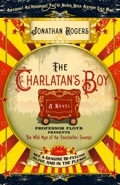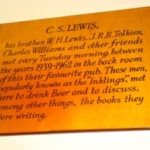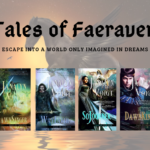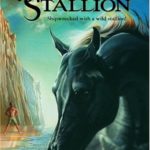Guest Blog – Jonathan Rogers
 Jonathan Rogers is the author of four middle grade fantasy novels – the Wilderking Trilogy and the newly released The Charlatan’s Boy. Besides all the traditional places, The Charlatan’s Boy may be purchased at The Rabbit Room where Jonathan hangs out with several other fantasy writers including Andrew Peterson, author of the Wingfeather Saga (On the Edge of the Dark Sea of Darkness and North! Or Be Eaten).
Jonathan Rogers is the author of four middle grade fantasy novels – the Wilderking Trilogy and the newly released The Charlatan’s Boy. Besides all the traditional places, The Charlatan’s Boy may be purchased at The Rabbit Room where Jonathan hangs out with several other fantasy writers including Andrew Peterson, author of the Wingfeather Saga (On the Edge of the Dark Sea of Darkness and North! Or Be Eaten).
Feechies and Cowboys: The Charlatan’s Boy and Frontier Fantasy
A couple of years ago I was part of a not-entirely successful experiment by five or six fantasy writers to co-write a story online. Wayne Thomas Batson would post a few pages, then Donita K. Paul would post a few pages, then L.B. Graham, then Eric Reinhold, then Christopher Hopper, then me. Each writer brought to bear his or her unique take on the fantasy genre. If I remember correctly, Wayne started things off in a dark, creepy forest. Donita, as you might expect, brought in a dragon or two. When it was my turn, I introduced a buckskin-clad cattle rustler who got it in his head to steal the dragon.
It will come as no surprise that the story quickly became a sprawling and completely unmanageable mess. But even the mess demonstrated one of the great things about the fantasy genre. It’s a huge, sprawling genre with room for a lot of different kinds of stories, from L.B. Graham’s epics to Donita Paul’s brightly lit dragon stories to Sharon Hinck’s soccer mom portal stories. And fantasy, more or less by definition, invites its practitioners to invent new subgenres.
To that end, I’ve been staking out a little claim in what I believe to be unexplored territory in fantasy’s vast country. I call it frontier fantasy. Fantasy is always about frontiers, I suppose. The hobbits’ movement away from the cozy comforts of Hobbiton and into terra incognita with all its dangers and rewards serves as a metaphor for how all fantasy stories work.
My stories—both the Wilderking books and The Charlatan’s Boy—play with that idea by turning those narrative frontiers into something that looks a whole lot like the American frontier.
 I have always spoken of my books as “fantasy stories told in an American accent.” Still, in the Wilderking books there were vestiges of the British-European-medieval traditions that prevail in most fantasy stories. There was a king, a castle, a class of nobles who ruled in a semi-feudal system. In The Charlatan’s Boy I decided to lose even those vestiges and try out a story that is as American as possible without actually being set in America. There are hunters, hucksters, cowboys, trappers, swampers, cattle rustlers. The dangers are frontier dangers, and the humor tends to be the rough and ready humor of the American frontier tradition.
I have always spoken of my books as “fantasy stories told in an American accent.” Still, in the Wilderking books there were vestiges of the British-European-medieval traditions that prevail in most fantasy stories. There was a king, a castle, a class of nobles who ruled in a semi-feudal system. In The Charlatan’s Boy I decided to lose even those vestiges and try out a story that is as American as possible without actually being set in America. There are hunters, hucksters, cowboys, trappers, swampers, cattle rustlers. The dangers are frontier dangers, and the humor tends to be the rough and ready humor of the American frontier tradition.
Grady, our narrator, is an unusually ugly orphan boy who travels with a huckster named Floyd perpetrating one scheme after another on the good villagers throughout Corenwald. Their most successful scheme has been a feechie act in which Grady dresses up as ‘The Wild Man of the Feechiefen Swamp.’ The fact that nobody believes in feechies anymore has complicated their lives considerably.
Hucksterism isn’t uniquely or exclusively American. Still, the con artist/snake oil salesman is an important trope in American literature and culture. So are the cowboy, the boaster, good-hearted but gullible villager. Versions of all these figures find their way into The Charlatan’s Boy. When people ask me what The Charlatan’s Boy is like, I tell them that it is, to my knowledge, the first book ever to have both feechiefolks and cowboys.
I get the feeling that American fantasy writers think of themselves as participating in the fantasy literary tradition much more than they think of themselves as participating in the American literary tradition. Americans have an incredible storytelling legacy, both verbal and literary. Consider Huck Finn, in which Twain harnessed the vitality and vigor of the vernacular storytelling tradition for literary purposes—and gave us the Great American Novel. As an American, I’m the inheritor of that legacy; it’s my native tongue. To me it made a lot of sense to speak that language in The Charlatan’s Boy.










































Lovely post. I’ve read the Wilderking Trilogy…now I understand why I think of it as a cross between CS Lewis and Mark Twain. 0=) Looking forward to the new one. I would say more, but “that’s all there is; there isn’t anymore.”
[…] in spite of all that, I posted a guest blog article by Jonathan Rogers over at Speculative Faith. Jonathan is an exceptional author and his newest book, The Charlatan’s Boy, released this […]
I had never thought about “American fantasy” before. Really, it hadn’t dawned on me how European most fantasy is until I started intentionally going for a little Latin American flavor.
But nothing like you’ve done, Jonathan. At least in the Wilderking Trilogy, your voice is so Twain-ish.
I also thought of Paul Bunyan as an example of distinctive American lit. Then there are the southern authors, who I do think have emulated.
But Twain is unique. And now we have the feechie/cowboy mix. Really should be fun.
Becky
Awesome concept, Jonathan. I’ve had a somewhat similar idea boiling in the back of my mind, blending the old west with the middle ages. We’ll see if anything ever comes of it but I love the idea and look forward to reading The Charlatan’s Boy soon.
It’s this diverse creativity in the fantasy genre that makes it so enjoyable and impossible to narrowly label.
Ever since I saw this title on CBD’s online list I’ve been eagerly anticipating it as something rather different, which I’m usually game for. I second the part about needing to broaden beyond the typical middle-ages European tropes, even if this supposedly Medeval setting usually has anachronistic tobacco and potatoes. 😉 I’ve intentionally tried to seek out fantasy stories that are set in a more asian or middle eastern setting, though these can be difficult if you don’t have an understanding of those culture’s mythologies. Regardless, “Charlatan’s Boy” looks like great fun.
This was extremely refreshing to read. The burden of northern european fantasy hangs over us all. Many Australian authors are really good at this and don’t even attempt to explore a local kind of fantasy. On the Where the Map Ends boards an article of mine was discussed. It was about what I learned about writing from Tolkien. One of my points was “don’t write about elves”. This lead to some discussion about what I really meant.
Tolkien had set out of recover a mythology for England, which he thought had been lost in their quest for Empire. I was suggesting that writers should try to uncover the mythology of whatever culture they found themselves in, rather than just reproduce whatever it was they had just enjoyed reading. I am aware that many Australian writers who began in the 1970s have in their bottom drawer an epic involving elves and dwarves and magic rings. Thankfully most of them will never see the light of day.
The group on Where the Map Ends began discussing what an American mythology would look like. Naturally they said it would contain everything. This reflects what I call the delusion of empire: we are everyone and everyone is us. I don’t believe this is true. I think it is just the ruling imperial power unable to see itself except in its own conception.
It’s so refreshing to see someone undeluded. I’m going to celebrate by buying a copy of this book. There is 1 copy available locally, which I intend to snap up. I hope the charxcters are drinking whisky and playing cards. It is so easy to overlook the fact that the American West was not settled by aristos from Europe. If it had they would be drinking wine and playing board games. Instead it was settled by those escaping grinding poverty — the lower classes. That’s why they drink spirits and play cards.
Incidentally, in response to the Where the Map Ends discussion I bought myself a copy of American Gods by Neil Gaiman. But I only ever got a third of the way through it (so far) so I can’t really comment on its place in this discussion. But it is at least another attempt at tying together fantasy and American culture.
Which article? I’m a massive lurker.
If you are referring to my article, I probably couldn’t find it again on Where the Map Ends. But the original was posted at:
http://jmm.aaa.net.au/articles/2235.htm
It is titled What I Learnt from Tolkien about Writing.
Thanks, everybody, for your warm welcome. Kirk, you mentioned blending the medieval and the western. If you take away guns and gunpowder and set things in a pre-railroad era, there’s plenty of overlap.
Ken, your remarks about imperialism and fiction are very interesting…I’m still pondering them in my heart.
I’ve got to run pick up my daughter from ballet, but thanks everybody…
[…] Recently Jonathan Rogers author of the middle grade Christian fantasy, The Wilderking Trilogy and the new release, The Charlatan’s Boy, discussed his writing style in a guest blog post at Speculative Faith. […]
[…] after the book released Dr. Rogers did a guest post at Speculative Faith. Which got me to thinking, and I ended up featuring him in a post on my editing blog—Rewrite, […]
[…] (The Charlatan’s Boy, The WilderKing Trilogy). Rogers has written two articles (this one, and this one) for Speculative […]